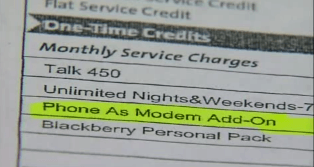 A Sprint customer in Tulsa, Okla., was recently sold a Blackberry plan that included a data add-on service that allowed him to tether his Sprint wireless connection to his laptop, perfect for wireless broadband on the go.
A Sprint customer in Tulsa, Okla., was recently sold a Blackberry plan that included a data add-on service that allowed him to tether his Sprint wireless connection to his laptop, perfect for wireless broadband on the go.
John signed a two-year contract with the company, which included a copy of his plan choice and the charges associated with his account. There it was, right on his bill — Sprint’s “Phone as Modem” add-on, priced at $15 per month.
A few weeks later, the service stopped working, and after multiple phone calls with Sprint, John was told he should have never been sold that data plan add-on; it was only available to corporate customers, not individuals.
John pointed to his contract with Sprint, which clearly showed he was paying to receive the service, but Sprint didn’t care. Nor would it permit him to exchange his phone for wireless broadband equipment that would provide him with the broadband service he needed. Why? Because he was already into his two year contract.
John was left fuming, wondering why Sprint’s contracts allow them to renege on a deal made fair and square while trapping him with equipment he can no longer use to obtain the service he needs.
 “To me, they voided the contract when they took away the service without my knowledge,” John told KJRH-TV’s Problem Solver Pete Knutson. “This is principle, this is sole principle.”
“To me, they voided the contract when they took away the service without my knowledge,” John told KJRH-TV’s Problem Solver Pete Knutson. “This is principle, this is sole principle.”
John canceled his contract, but Sprint promptly billed him a $125 early termination fee and sent his account to collections, threatening his credit rating.
John was not alone in his predicament.
Sprint quietly canceled its individual “phone as modem” tethering option for Blackberry owners last April, literally stripping the feature off of any plan set up with a personal Social Security number. Business accounts configured with a Taxpayer ID Number associated with the business name on the account kept the option.
Sprint was supposed to notify affected customers through bill inserts, but since most Sprint customers are now billed electronically, few customers got the message.
Several customers reported they were “notified” when the service simply stopped working one day last spring. One Shenandoah Valley customer found out the hard way.
“My wife used her 8330 for internet access, and we purchased the MBR900 to tether the phone so she could have it in the best place for reception,” the customer notes. “Sprint decided to disable the use of the phone as a modem, I thought the router went kaput until she called Sprint.”
It took five rounds of calls with Sprint customer service before finding a support representative with the real answer.
An even bigger question is why a Sprint salesperson pitched John a plan with an option that has not been sold to individuals for nine months.
As has so often been the case, phone companies seeking to avoid bad publicity nearly always waive fees and credit a customer’s account when the media comes calling. John’s account balance was brought back from collections and promptly credited to reflect a zero balance.
Sprint refused to provide a specific explanation for how this happened. Channel 2’s Knutson advises customers to always check their cell phone contracts to make sure they are actually getting the services they are paying to receive.
[flv width=”480″ height=”380″]http://www.phillipdampier.com/video/KJRH Tulsa Cell company drops service still charges cancellation fee 1-13-11.flv[/flv]
KJRH-TV in Tulsa shares the story of John, a former Sprint customer who didn’t get the service his contract promised. (2 minutes)


 Subscribe
Subscribe